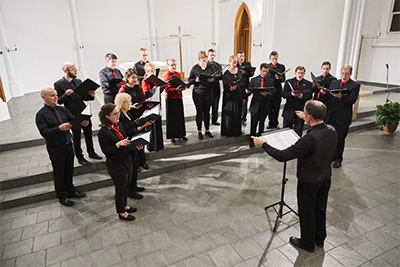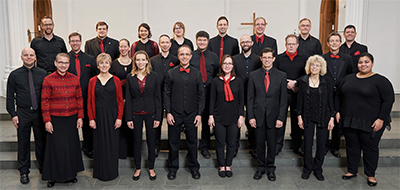by Daniel Hathaway

Both concerts are free, and will cover a wide range of pre- and post-Reformation music by John Dunstable, Leonel Power, William Cornysh, William Byrd, Richard Dering, Peter Philips, Robert White, and Robert Parsons. Quire is also inviting the public to witness the final polishing of the repertoire by attending a free rehearsal on Friday, May 3 from 6:45 to 9:30 pm at the Lakewood venue (online registration is required).
I reached Quire’s artistic director Jay White by telephone at his studio at Kent State University to chat about the music he has chosen for this program. I began by asking why English music of the period seems so rich in references to Mary.
“I think it had a lot to do with Queen Elizabeth’s desire to glorify women in her world, and she herself was known as the Virgin Queen,” White said. “But Catholics also took a great interest in highlighting Mary over Jesus. That was probably a safer bet if you had to go underground.”
White has structured his program around a set of hymns to Mary. “I started building the program with the Ave Maria, and it occurred to me that there were a lot of works that celebrated Mary as the vessel for Christ, and alluded to her intercessory role between us and the divine,” he said. “Because there’s very little written about her in the scriptures, people could be inventive in describing her with flowery language that refers to her beauty, love, charity, and kindness, and equate her with the stars and the sea.”
White’s program is a mix of music that preceded and followed the Church of England’s split with the Bishop of Rome. Pre-Reformation music tended toward multiple voice parts and polyphonic complexity, reaching its height in the motets of the Eton Choirbook. After Protestants came into power, musical textures became simpler and stressed the need for hearers to be able to clearly understand texts.

Among other favorites on the program, White said he loves Robert Parsons’ Ave Maria, a piece he discovered while singing with a now-defunct vocal ensemble in Washington, D.C. It opened the door to multiple Tudor composers for him. “Oh — there are others out there besides Byrd and Tallis. And Parsons’ piece ends with one of the most beautiful ‘Amens’ ever written — including Franz Biebl’s.”
In general, White said that English music ingratiates itself to the ear through its proclivity for major thirds. “The cross-relations [notes that suddenly clash with each other] add interest, but English harmonies are a little broader and more expansive than in continental music.”
By the time the open rehearsal rolls around, Jay White and his singers should be ready for a final run-through, what he calls “a more refined process than a working rehearsal, because it comes at the end.” He plans to talk a bit about the music and hopes to have some time left to take questions.
Although Quire’s concerts are scheduled the week before an important annual event, White signed off our conversation with a little marketing ploy. “Here’s an opportunity to bring your mom to a pre-Mother’s Day event in honor of one of the greatest mothers ever known.”
Published on ClevelandClassical.com April 29, 2019.
Click here for a printable copy of this article


